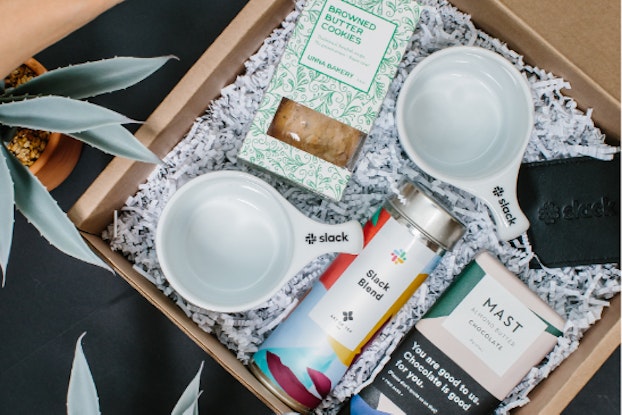
Why it matters:
- The $242 billion corporate gifting market is expected to grow at an average annual rate of 8% and reach $306 billion by 2024.
- The pandemic, remote work, labor shortages, and the Great Resignation have caused companies to sharply increase their budgets for employee gifts and rewards to foster connections with employees.
- Against that backdrop, digital startups are reshaping the corporate gift space by bringing a modern twist to a traditional business.
Corporate gifting has always been a big business, but during the pandemic it became a lot bigger. That growth is expected to continue, as companies large and small look for new ways to motivate and manage remote workforces and connect with clients.
Digital startups are swooping in to grab market share with a new spin on corporate gifts, touting offerings from experiential adventures and better quality products to design-your-own gift options.

Interested in a small business membership?
Find out how the U.S. Chamber of Commerce can help your company grow and thrive in today's rapidly-evolving business environment. Connect with our team to learn how a small business membership can benefit your bottom line and help you achieve your goals.
Spending on corporate gifts is growing at a faster pace than personal gift-giving, according to a 2021 report by Coresight Research. U.S. corporate gifting jumped from $217 billion in 2019 to an estimated $242 billion in 2021, and that growth is expected to continue. The industry is forecast to grow at an annual average rate of 8% and hit $306 billion in 2024.
Coresight Research surveyed 300 corporate gift buyers and found that the pandemic increased both the frequency of gift giving, and the amount spent on gifts. Relationship building is the most important benefit of corporate gifts, those buyers said. But they would like to see more innovation and variety in the market.
Startups (and an industry heavyweight) modernize the corporate gift space
Even before the pandemic hit, several digitally native disruptors born over the past decade have been seeking to modernize the corporate gifting industry, which until recently operated largely offline.
Big players have also jumped on the growth opportunity. Gifting conglomerate 1-800-Flowers.com, which owns Harry & David and other popular gift brands, last year launched a software platform designed to let business accounts manage employee and client gifts.
While corporate gifting is only about 10% of 1-800-Flowers’ total sales, it’s one of the company’s fastest-growing segments.
[Read: How 1-800-Flowers Changed Its Corporate Gifting Strategy to Monetize the Remote Workforce Trend]
A number of gifting startups set out not only to modernize the process of ordering and sending gifts but also to make corporate gifts more aligned with what today’s employees and clients want to receive.
CO— spoke with the founders of three fast-growing, next-generation gifting companies about the opportunities in the space.

Blueboard: Experience gifts take off post-pandemic
Blueboard, a gifting platform that makes it easy for companies to reward employees and clients with personalized experiences, was created after one of the founders, Taylor Smith, received a corporate gift that missed the mark.
Smith had just finished three months of 80-hour weeks completing a project for his employer, a Fortune 500 consulting firm. His boss, to thank him, handed him a $500 American Express gift card.
Instead of making him feel valued and appreciated, the impersonal gift had the opposite effect, Smith said. He went home and told his then roommate, Kevin Yip, about it. They started talking about the type of gifts that would have made him happier – something that reflected the stress he had been under and that encouraged him to take time away from work and do something fun or relaxing.
Smith and Yip came up with a plan for a company that would let employees and other corporate gift recipients chose among hundreds of experiences ranging from a spa treatment to a ski diving adventure, or for Blueboard’s most high-end accounts, something as lavish as an African safari for four, or a family vacation to Hawaii.
The philosophy behind Blueboard, which launched in 2014, is that experiences contribute more to long-term happiness and do more to foster social connections than material goods.
The startup has seen its revenue skyrocket and its client list more than triple over the past two years, Smith said. And companies are investing more each year in rewards and appreciation gifts. Blueboard has seen spending by its clients with ongoing accounts consistently grow at a rate of 16% year-over-year, Smith said.
Companies “just see that it works,” Smith told CO—. They see recipients of Blueboard gifts posting on Instagram about how happy they are and praising the companies they work for or do business with.
Companies set a price for the experience, ranging from $150 to as much as $25,000, and recipients choose from a menu of available experiences. The most popular choices, Smith said, tend to be relaxation experiences such as a massage or facial, weekend getaways, or food experiences such as a special restaurant visit or a cooking class.
Blueboard has raised $16 million in investment funding since its launch, and it plans to use its latest round to expand into new geographic markets.
The company was hit during the early months of the pandemic, which shut down on-site experiences and outings, but it quickly pivoted to offer in-home experiences, such as build-your-own-greenhouse kits and science experiments for kids.
In 2021, however, demand came “roaring back,” he said. This year, inbound requests from clients and potential clients are more than double compared to 2021.
“There’s such a talent shortage. Companies are really investing in their people right now at a much faster rate than we’ve seen in the past,” Smith said.
[Read: Work-From-Home Revolution Yields Opportunity for Local Small Businesses]

Gemnote: ‘Well designed and unique’ gifts help drive 150% growth
Ashley Wong Tsui and Diane Liu, who launched gifting platform Gemnote in San Francisco in 2015, were nervous that the pandemic would hurt sales. Instead, the opposite happened, the founders told CO—.
“Because people were working remotely, companies wanted to make connections with their employees and customers, so they were sending lots of work-from-home kits, customer appreciation gifts, employee appreciation,” Wong-Tsui said.
Also, the cancellation of events and conferences freed up millions budgeted for those in-person functions, and companies shifted that money into gifts, spending more with Gemnote.
Gemnote, which has been largely bootstrapped after getting $120,000 in funding from the Y Combinator accelerator program, has grown to $12 million in sales this year. Its sales have jumped 150% since the start of the pandemic.

The company’s niche is better quality gifts that can be customized with corporate logos or other designs, and themed gift sets for virtual events and special occasions.
The goal of Wong Tsui and Liu in founding Gemnote was to combine an easy-to-use technology platform with the ability to send high-quality, thoughtfully chosen, sustainable gifts.
They set out to replace commonplace, throw-away, logo-embossed merchandise with quality products from brands like Patagonia, The North Face, and S’well that recipients will be happy to wear or use in their homes.
“We want to make sure that the products are well designed, they’re unique, and they’re durable,” Liu said. Companies also are asking for products from sustainable and mission-driven brands for their gifting programs, she said.
Companies who use Gemnote are connected with a customer success manager who helps them plan out a gift that matches the company’s specific needs.
“We try to understand the client, their use case, their budget, their need, and from there we come up with recommendations,” Liu said.
Coresight Research surveyed 300 corporate gift buyers and found that the pandemic increased both the frequency of gift giving, and the amount spent on gifts.
Currently, Wong Tsui and Liu said, companies are spending on new hire gifts, work-from-home-gifts, and themed gift sets tied to corporate outing and retreats, both virtual and in-person.
Gemnote has also been seeing a lot of requests lately for new baby gifts and other gifts that celebrate personal milestones.
The startup is looking to expand later this year by opening its technology platform to influencers and content creators who want to use it to create and sell their own custom merchandise.
“We want to be able to leverage content creators and influencers who are building their own brands on social media to be able to start selling their own merch,” Wong Tsui said.

Sugarwish: A kid-in-a-candy-store model for gifting
Elisabeth Vezzani was working in business development, and one day, while watching her son’s soccer game, she found herself talking to another mom about how hard it was to find corporate gifts that weren’t boring, cliched, or overused.
The other mom, Leslie Lyon, commented on how when she worked in New York City, a favorite outing was coworker breaks to visit candy stores. Picking out the sweets was as much fun as eating them, Lyon said.
“We thought, ‘What if we could create something that would deliver that feeling — that kid-in-the-candy-store joy — to the person you’re sending the gift to?’” Vezzani told CO—.
That discussion led Vezzani and Lyon to launch Sugarwish in 2012, a gift company that lets recipients pick their gifts from an array of categories including candy, cookies, snacks, popcorn, coffees and teas, and wine.
The company has seen its sales grow by more than 15 times since 2019. While Sugarwish does not disclose its exact revenue, its sales are more than $30 million, and it has over 40,000 corporate clients.
Sugarwish is designed to give someone the fun experience of picking out exactly the treat they want, Vezzani said. Gift recipients receive an email telling them they have received a pre-paid Sugarwish gift, and then choose what types of candy or other treats they want and where they want them sent through a digital platform.
Companies have been using the gifts as icebreakers for virtual meetings.
“It’s fun for people to talk about what they picked, and it always brings out memories about Sour Patch Kids or Mary Jane candies or Bit-O-Honey. People light up when they talk about what they picked and why,” she said.
They have continued to update the platform to respond to changing corporate needs, including a feature that lets companies share Sugarwish gifts with employees through a Slack channel or on Microsoft Teams.

Sugarwish has largely bootstrapped its way to growth, starting with $300,000 from angel investors. Last year it raised an additional $2 million to acquire Vinebox, which now allows Sugarwish to send wine-tasting gifts with samples of several wines.
Sugarwish recently added pet treats to the gift options, and it plans to grow by adding more product categories, including non-food items like candles.
This March, National Employee Appreciation Day was the second biggest sales day ever in the history of the company.
“What used to be a nice-to-have has become a must-have, as companies are saying, ‘How are we going to keep everybody happy and engaged?’” Vezzani said.
CO— aims to bring you inspiration from leading respected experts. However, before making any business decision, you should consult a professional who can advise you based on your individual situation.
Follow us on Instagram for more expert tips & business owners’ stories.
CO—is committed to helping you start, run and grow your small business. Learn more about the benefits of small business membership in the U.S. Chamber of Commerce, here.







